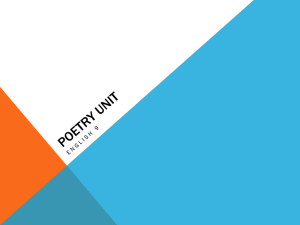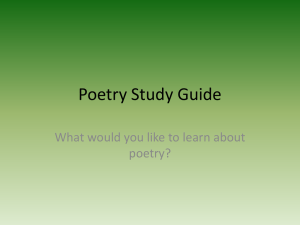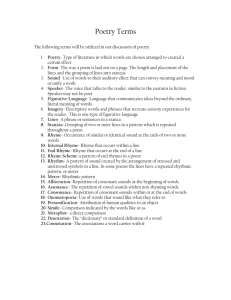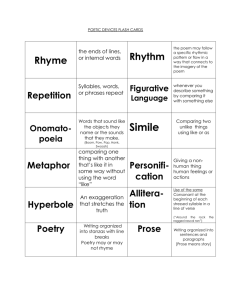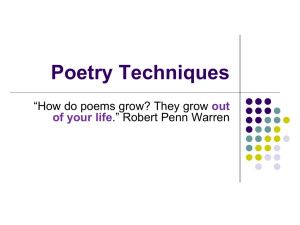Poetry Terms
advertisement
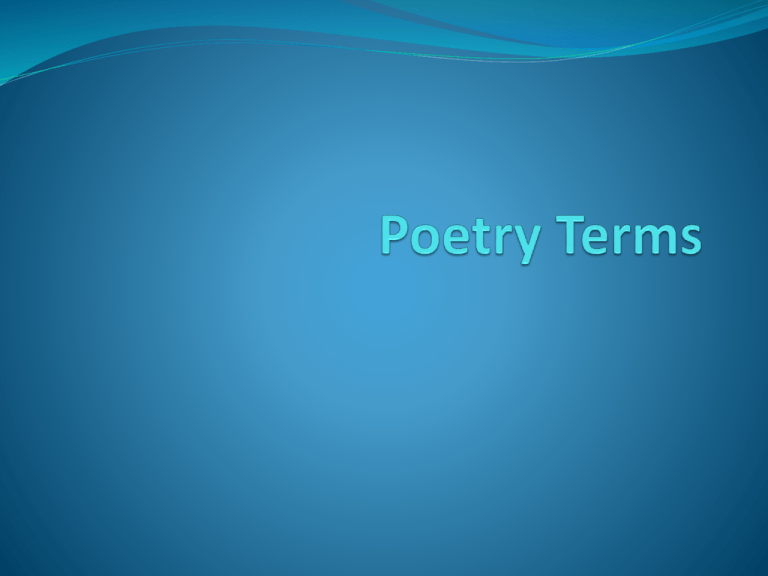
Alliteration The repetition of a consonant sound at the beginning of neighboring words. (Consonants are all the letters except a, e, i, o, u, and y.) EXAMPLE: The dark dance of death whisked her away. Repetition of the “d” sound in “dark dance of death” Like a lucky charm, he looks on. Repetition of the “l” sound in “Like,” “lucky,” and “looks” Allusion • A reference to a well-known person, place, event, literary work, or work of art EXAMPLE: In Martin Luther King, Jr's "I Have A Dream" speech, he started off by saying "Five score years ago". He was alluding to Abraham Lincoln's Gettysburg Address which started with the phrase "Four score and seven years ago". Assonance The repetition of vowel sounds of neighboring words. (Vowels are a, e, i, o, u, and y.) EXAMPLES: Talking and walking, hours on end. Repetition of the “ah” sound in “talking” “walking” A turtle in the fertile soil. Repetition of the “er” sound in “turtle” “fertile” Couplet Two successive lines of poetry with end-words that rhyme. They often work as a unit. EXAMPLE: True wit is nature to advantage dress'd; What oft was thought, but ne'er so well express'd. — Alexander Pope Free Verse Poetry not written in a regular rhythmical pattern or meter; a poem that does not rhyme and does not conform to a standard beat or rhythm EXAMPLE: next slide "Oranges" Gary Soto (1995) The first time I walked With a girl, I was twelve, Cold, and weighted down With two oranges in my jacket. December. Frost cracking Beneath my steps, my breath Before me, then gone, As I walked toward Her house, the one whose Porch light burned yellow Night and day, in any weather. A dog barked at me, until She came out pulling At her gloves, face bright With rouge. I smiled, Touched her shoulder, and led Her down the street, across A used car lot and a line Of newly planted trees. . . . . Hyperbole An exaggeration (to emphasize something or for humorous purposes). EXAMPLES: I love you more than life itself. Love is exaggerated. He could eat a horse. His appetite is exaggerated. Idiom an expression that does not mean what it looks like it should EXAMPLES: It’s raining cats and dogs. Don’t Let the cat out of the bag. Imagery A word or phrase that appeals to one or more of the five senses EXAMPLE: From “Mrs. Flowers” by Maya Angelou A small widening of her thin black lips to show even, small white teeth, then the effortless closing. Internal Rhyme Rhyme within a line EXAMPLE: “Back into the chamber turning, all my soul within me burning.” Irony Saying the opposite of what you actually mean; a contradiction between what is expected and what actually happens EXAMPLE: The name of Britain’s biggest dog was “Tiny” Words words deceive the masses lies then become truth Lyric Poetry Highly musical verse that expresses the observations and feelings of a single speaker Metaphor A comparison of two unlike things without using like or as. EXAMPLES: . Bob is a hungry wolf. Bob is compared to a wolf. Sue is a rose, filling the room with her sweet scent. Sue (or Sue’s scent) and rose are being compared. Narrative Poetry A story told in verse (a story in poem form) EXAMPLE: “Casey at the Bat” a poem about a baseball game and how one man could win it or lose it. Onomatopoeia Words which imitate the sound they refer to. EXAMPLES: The eagle whizzed past the buzzing bees. “whizzed” and “buzzing” Rip-roar fire, the gun stutters on. “Rip-roar” and “stutters” Personification A type of metaphor in which non-human things or ideas possess human qualities or actions. Examples The wind whispered her name. Wind is being personified: “wind whispered”, because “wind” can’t actually “whisper.” Justice is blind. Justice is being personified: blind justice, because justice has no actual eyes that could be blinded. Repetition A sound, word, phrase or sentence that is repeated in a story or poem From “The Highwayman” “…and the highwayman came riding, riding, riding, The highwayman came riding up to the old inn door.” (riding & the highwayman) Rhyme Scheme A pattern of rhyme in a poem EXAMPLE: Roses are red A Violets are blue B Sugar is sweet C And so are you! B Simile A comparison of two unlike things using the words like or as. EXAMPLES: Bob is hungry as a wolf. Bob and wolf are the two things being compared, using “as” Sue smells like a rose. Sue & rose are the two things being compared, using “like” Speaker The imaginary voice of the poet in a poem Like a narrator Stanza A formal division of lines in a poem considered as a unit Similar to a paragraph in prose (regular writing)
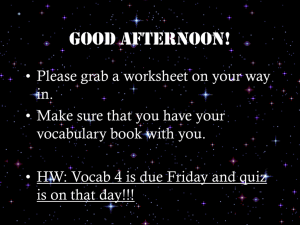
![English poetic terms[1].](http://s3.studylib.net/store/data/009640365_1-09d91eea13bb5c84d21798e29d4b36a3-300x300.png)
